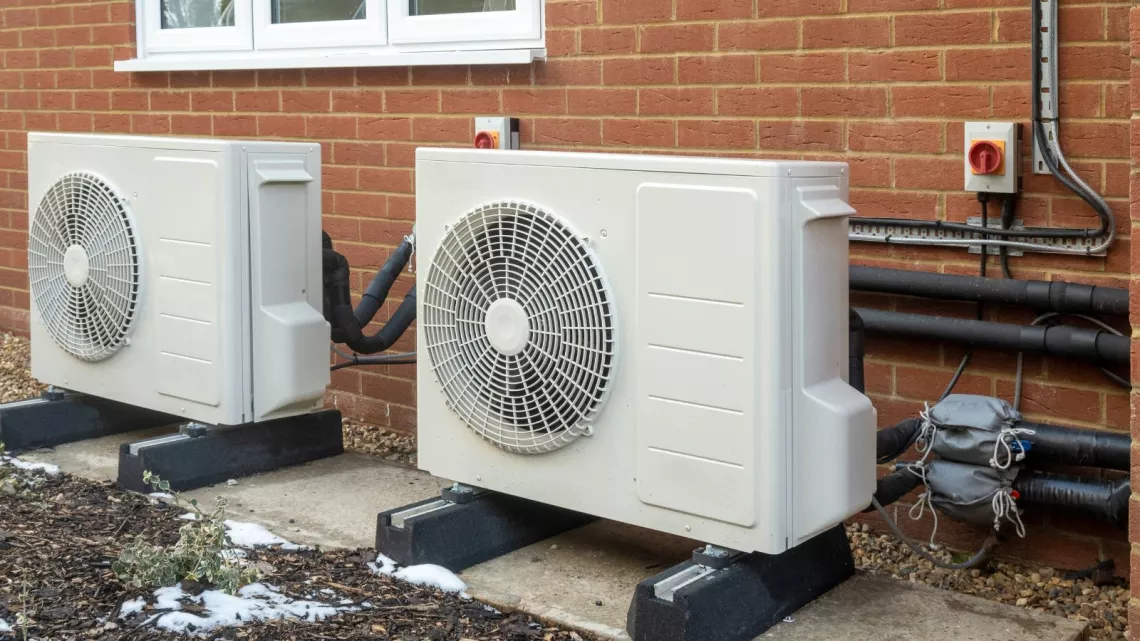Moving Away from Gas Is A Climate Imperative
New Study Finds Action Is Needed Now to Minimize Costs for Those Who May Continue to Rely on Gas in the Coming Years

Photograph of two heat pumps
To achieve Maryland’s climate target of net-zero greenhouse emissions by 2045, 95% of the fossil fuels currently used in buildings for space and water heating and for cooking must be replaced with more climate friendly equipment powered by clean electricity. The fossil fuels Marylanders use in our buildings are responsible for over 13% of the climate warming gases emitted in Maryland. They produce more greenhouse gases than burning coal. A recent study published by the Maryland Office of the People’s Counsel – whose job it is to protect residential utility users consistent with the state’s climate goals – warns that Maryland gas utilities must begin to shift their practices now to minimize what could be substantial gas rate increases for those users who, for whatever reason, may lag behind in electrifying their homes.
Electric heat pumps are the most energy efficient way to reduce greenhouse gases in our buildings. Cold climate heat pumps are three times as efficient as gas, oil, and propane furnaces. Electric heat pumps provide both heating and air conditioning. Separate heat pumps can heat our hot water.
In addition to playing a key role in mitigating climate change, heat pumps are beneficial financially. In new construction, high efficiency heat pumps are cheaper to purchase and install. In existing construction, when replacing gas furnaces at the end of their useful lives, heat pumps are cheaper in the long term. Their up-front cost is comparable to or only modestly higher than the cost of a replacement gas furnace, but then result in lower annual utility bills year after year (according to energy price projections).
Maryland has a highly effective energy efficiency program, known as EmPOWER Maryland, but focusing only on reducing or constraining electricity usage will not get us to net-zero by 2045. Instead, we need update the program so that it provides incentives for families to transition away from gas to heat pumps. Currently, incentives are working in exactly the wrong direction, with Maryland utilities encouraging consumers to continue using gas by providing subsidies for replacement gas furnaces. The Maryland Commission on Climate Change and the Sierra Club both are calling for using EmPOWER funds to support transitioning from gas to heat pumps, and to stop subsidizing gas building heating and hot water heating. Today, about 20% of Marylanders use heat pumps and the share of homes using heat pumps has been rising.
The study by the Office of People’s Counsel carefully explains why the necessary transition to heat pumps requires astute financial planning. As Marylanders install more heat pumps, the number of households and businesses paying gas bills will shrink. But the gas utilities will still need funds to operate their infrastructure (including pipes in the street) and conduct operations to service the remaining gas users. Doing the math, this means that there is a danger that the cost per household and business to run on natural gas may rise dramatically over time.
The People’s Counsel estimates that the remaining gas customers could eventually face bills over ten times as high as Maryland moves to reduce fossil fuel use in our homes. For example, the annual costs for the average Baltimore Gas & Electric household customer, with low fossil fuel gases, could rise from $820 per year to a least $1464 per year by 2035 and to at least $4634 by 2050. Accordingly, the Office of People’s Counsel is urging utilities to adapt by modifying their spending practices to lessen their revenue requirements.
Maryland must be especially vigilant to ensure that low-income residents do not bear the future costs of a legacy gas system, which means we need to ensure that low-income homes can electrify in the next few years. EmPOWER incentives can help low-income families make the transition to more efficient heat pumps.
For more information, contact mark.posner@mdsierra.org.